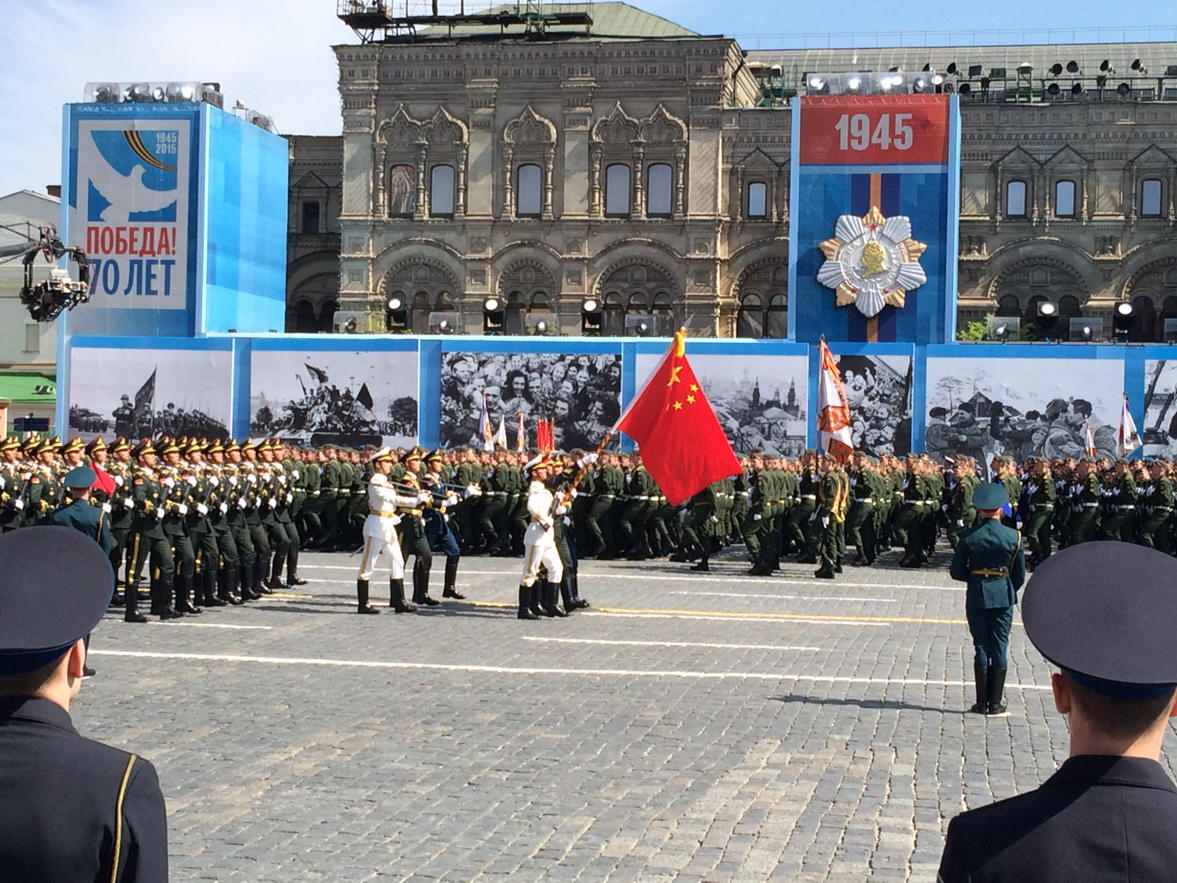China and Russia Demonstrate Closer Relationship with Joint Military Exercises
Michael Krieger | Posted Friday May 8, 2015 at 3:50 pm
http://libertyblitzkrieg.com/2015/05/08 ... exercises/
BEIJING — When a Chinese honor guard joins a military parade in Russia’s capital this weekend, watched by China’s President Xi Jinping, it will mark more than just a symbolic recognition of the two countries’ contributions to the Allied victory in 1945.

China’s participation also reflects an upgrade of its military ties with Russia, including joint naval exercises and a revival of arms purchases, that could complicate U.S.-led efforts to counter both nations’ expanding military activities, analysts and diplomats say.
They’ve basically come to a consensus that despite their differences over some national interests, they really face the same common enemy,” said Gilbert Rozman, an expert on China-Russia relations at Princeton University.
– From the Wall Street Journal article: China Parades Closer Ties in Moscow
One of the key themes here at Liberty Blitzkrieg has been the carelessness and ineptitude of those in charge of crafting U.S. foreign policy. I’m not naive, and I fully understand that the world is a dangerous place. Just as I believe individuals should have the right to defend themselves and their families with the right to bear arms, I also understand the importance of strong national defense.
The problem with current U.S. foreign policy is that it is not defensive in nature. Rather, all indications are that the U.S. government is acting offensively; primarily driven by ego and the will to dominate. Much of the world has come to see the U.S. not as a powerful partner, but as a narcissistic master. What American leadership fails to understand, is that by taking such a posture it is simply making others overseas feel paranoid and threatened, thus drawing them closer to each other and farther from the U.S.
The examples of U.S. foreign policy disaster since 9/11 are many, and I have listed several of them at the end of the post. However, the one I want to highlight today is the ongoing slow motion train wreck with regard to Russia.
As readers will be well aware, the U.S government has been attempting to apply severe pressure on the Russian economy in an attempt to weaken Vladimir Putin’s position at home, and ultimately topple his government. It is now clear that this strategy has completely failed. To make matters worse, the “strategy” has merely solidified the view amongst emerging powers of the need for a counter to U.S. aggression. Nowhere can this be seen more clearly than with the increasingly close relationship between Russia and China.
To summarize, not only did the U.S. foreign policy clowns’ strategy fail, it has actually served to weaken the American position considerably by bringing potentially dangerous geopolitical rivals closer together.
We learn of the following from the Wall Street Journal:
BEIJING — When a Chinese honor guard joins a military parade in Russia’s capital this weekend, watched by China’s President Xi Jinping, it will mark more than just a symbolic recognition of the two countries’ contributions to the Allied victory in 1945.
China’s participation also reflects an upgrade of its military ties with Russia, including joint naval exercises and a revival of arms purchases, that could complicate U.S.-led efforts to counter both nations’ expanding military activities, analysts and diplomats say.
The 102 Chinese troops who will join the Victory Day parade in Moscow on Saturday were seen during a rehearsal this week marching through streets near Red Square singing the Russian wartime ballad “Katyusha”, according to video footage posted online.
The only other foreign countries with troops in the parade are India, Mongolia, Serbia and six former Soviet states.
Yeah, just Russia, China and India. No big deal. Without France, they’re nobody.
Three Chinese navy ships also made a rare foray into the Black Sea on their way to join commemorations in Russia’s southern port of Novorossiysk on Saturday.
The Chinese ships—two missile destroyers and a supply vessel — will then take part in joint exercises with the Russian navy in the Mediterranean Sea for the first time, according to Chinese and Russian authorities.
Both sides say the drills aren’t directed at other countries, but the timing, after Russia’s 2014 annexation of Crimea, and the location, on NATO’s southern flank, have compounded Western concerns about an emerging Moscow-Beijing axis.
Gotta love that, “compounded Western concerns about an emerging Moscow-Beijing axis.” An axis that is happening precisely due to the aggressive and inept U.S. foreign policy to begin with.
On Wednesday, Russia’s government unveiled a draft cybersecurity deal with China under which both countries agree not to conduct cyberattacks against each other and to counteract technology that might disrupt their internal politics.
Mr. Xi also appears to share a personal affinity with Russian President Vladimir Putin who is seen by many in China as a strong, patriotic leader.
Last year, Moscow and Beijing staged joint naval exercises for the first time in the East China Sea, where China is embroiled in a territorial dispute with Japan. In September, Mr. Putin and some of his troops will join a military parade in China to mark the anniversary of Japan’s defeat in 1945.
The Pentagon says China is also now pursuing a new joint design and production program with Russia for diesel-electric submarines, which could be used to try to prevent U.S. ships from intervening in a conflict in Asia.
“They’ve basically come to a consensus that despite their differences over some national interests, they really face the same common enemy,” said Gilbert Rozman, an expert on China-Russia relations at Princeton University.
“I think they’re both sending a message that their relationship is stronger than outsiders generally expect and if others put pressure on either in their own arenas, the two will stand together.”
You can thank the idiotic neocons in both the Republican and Democratic parties for this outcome


